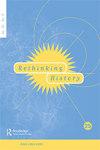‘You are, like, so woke’: Dickinson and the anachronistic turn in historical drama
IF 0.8
2区 历史学
Q1 HISTORY
引用次数: 1
Abstract
ABSTRACT Whilst scholars of historical fiction have largely moved away from the idea of accuracy as a means of assessing historical fiction, fidelity to historical facts continues to be considered an important generic requirement of the form. To include anachronisms in any historical fiction is usually considered a mistake or an embarrassment, a sign that the requisite attention to historical detail has lapsed. For a new spate of historical television shows such as Reign (2013–17), Dickinson (2019) and The Great (2020), however, authenticity is not located in an objective measure of accuracy or fidelity, but instead lies within the explicit, textual acknowledgement that the context of creation shapes all historical drama. Apple TV+’s comedy/drama Dickinson, in particular, entirely bypasses the question of accuracy by embracing intentional anachronism. With its soundtrack of contemporary music and a contemporary queer progressive sensibility, Dickinson uses anachronism to suggest a new way of thinking about one of the most mythologised and enigmatic of American literary icons. The show self-consciously draws overt parallels between past and present to emphasise the familiarity of the past, rather than its strangeness, thus rejecting triumphalist readings of history and positing a new way for contemporary audiences to understand and access history. Dickinson also suggests a definition of authenticity that is not reliant on the development of a sense of verisimilitude. In its use of intentional anachronism and its insistence on capturing a sense of affective accuracy, Dickinson suggests a new way of thinking about the function and form of historical fiction in the twenty-first century.“你太清醒了”:狄金森和历史剧中不合时宜的转折
虽然历史小说的学者们在很大程度上已经不再把准确性作为评估历史小说的一种手段,但对历史事实的忠诚仍然被认为是这种形式的一个重要的一般要求。在任何历史小说中包含时代错误通常被认为是一个错误或尴尬,这表明对历史细节的必要关注已经消失。然而,对于新一批历史电视剧,如《统治》(2013-17)、《狄金森》(2019)和《伟大》(2020),真实性并不在于客观衡量准确性或保真度,而是在于明确的文本承认,即创作背景塑造了所有历史剧。尤其是Apple TV+的喜剧/戏剧《Dickinson》,它通过有意的时代错误,完全绕过了准确性的问题。狄金森以当代音乐为配乐,以当代酷儿进步的感知力为背景,运用时代错误的手法,提出了一种思考美国文学偶像中最神秘、最神秘的人物之一的新方式。这场展览有意识地将过去和现在进行明显的对比,以强调对过去的熟悉,而不是它的陌生感,从而拒绝了对历史的必胜主义解读,并为当代观众提供了一种理解和接触历史的新方式。狄金森还提出了一个不依赖于真实感发展的真实性定义。狄金森运用有意的时代错误,并坚持捕捉情感上的准确性,为21世纪历史小说的功能和形式提供了一种新的思考方式。
本文章由计算机程序翻译,如有差异,请以英文原文为准。
求助全文
约1分钟内获得全文
求助全文
来源期刊

Rethinking History
Multiple-
CiteScore
1.20
自引率
0.00%
发文量
26
期刊介绍:
This acclaimed journal allows historians in a broad range of specialities to experiment with new ways of presenting and interpreting history. Rethinking History challenges the accepted ways of doing history and rethinks the traditional paradigms, providing a unique forum in which practitioners and theorists can debate and expand the boundaries of the discipline.
 求助内容:
求助内容: 应助结果提醒方式:
应助结果提醒方式:


